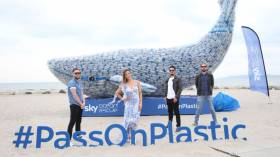Displaying items by tag: The Riptide Movement
New Web Series Follows The Riptide Movement As They Discover The Impact Of Plastic In Our Oceans
The Riptide Movement’s Plastic Oceans is a three-part web series that hopes to add to the urgent and important debate about how to solve the global plastic crisis and the devastating effect it is having on our marine life.
The Clean Coasts programme took Dublin rock band The Riptide Movement along the incredible Irish coastline and met with some of Ireland’s leading marine biologists, researchers, campaigners and Clean Coasts volunteers to discover the real impacts of plastic in our oceans and what it means for the future of all life on our planet, including us.
The Clean Coasts programme engages communities in the protection of Ireland's beaches, seas and marine life and currently has over 650 volunteer groups working along our Irish coastline, carrying out beach cleans and coastal protection work.
The band also visit a number of locations leading the way in tackling plastic waste including University College Cork, a Green Campus awarded site; chatted with Amanda Byram at the launch of Sky Ocean Rescue in Ireland; and sat down with the Minister for Housing, Planning & Local Government Eoghan Murphy to see what actions the government are taking and what can be done to address the issue at policy level.
Regarding wildlife, a visit to Ireland’s only seal sanctuary and a panel discussion with filmmaker Sophie Darlington highlights the impact our love of plastic is having on our marine animals.
The result is a web series aptly titled ‘The Riptide Movement’s Plastic Oceans’. Narrated by Jerry Fish, this web series highlights the extent of the plastic crisis in Ireland in an informative, artistic and engaging way, whilst also showcasing the small changes we can make to help stem the tide of single use plastics.
Talking about the web series and the bands’ collaboration with Clean Coasts, lead singer Malachy Tuohy said: “We hope this web series and our music can help raise more awareness around one of the greatest environmental challenges of our time.
“Our reliance on single use plastics is destroying our oceans, a reality so poignantly highlighted by David Attenborough in Blue Planet 2. Through our web series we wanted to learn about the issue of plastic pollution here in Ireland and what small changes we can make to help stem the tide of single use plastics.
“Our oceans are drowning in plastic and it is not the legacy we want our generation to be remembered for.”
Speaking about the web series, Clean Coasts manager Sinead McCoy said: “Litter and particularly marine litter has a huge long term negative impact on our environment. Raising public awareness is incredibly important when it comes to reducing marine litter which we see washing up on our coastline on a daily basis.
“So, the Clean Coasts programme is delighted The Riptide Movement are using their influence to bring attention to not only the issue of marine litter but the incredible work being done by Clean Coasts groups and our Clean Coasts stakeholders.”
For more information on how to get involved in Clean Coasts programme see cleancoasts.org





























































